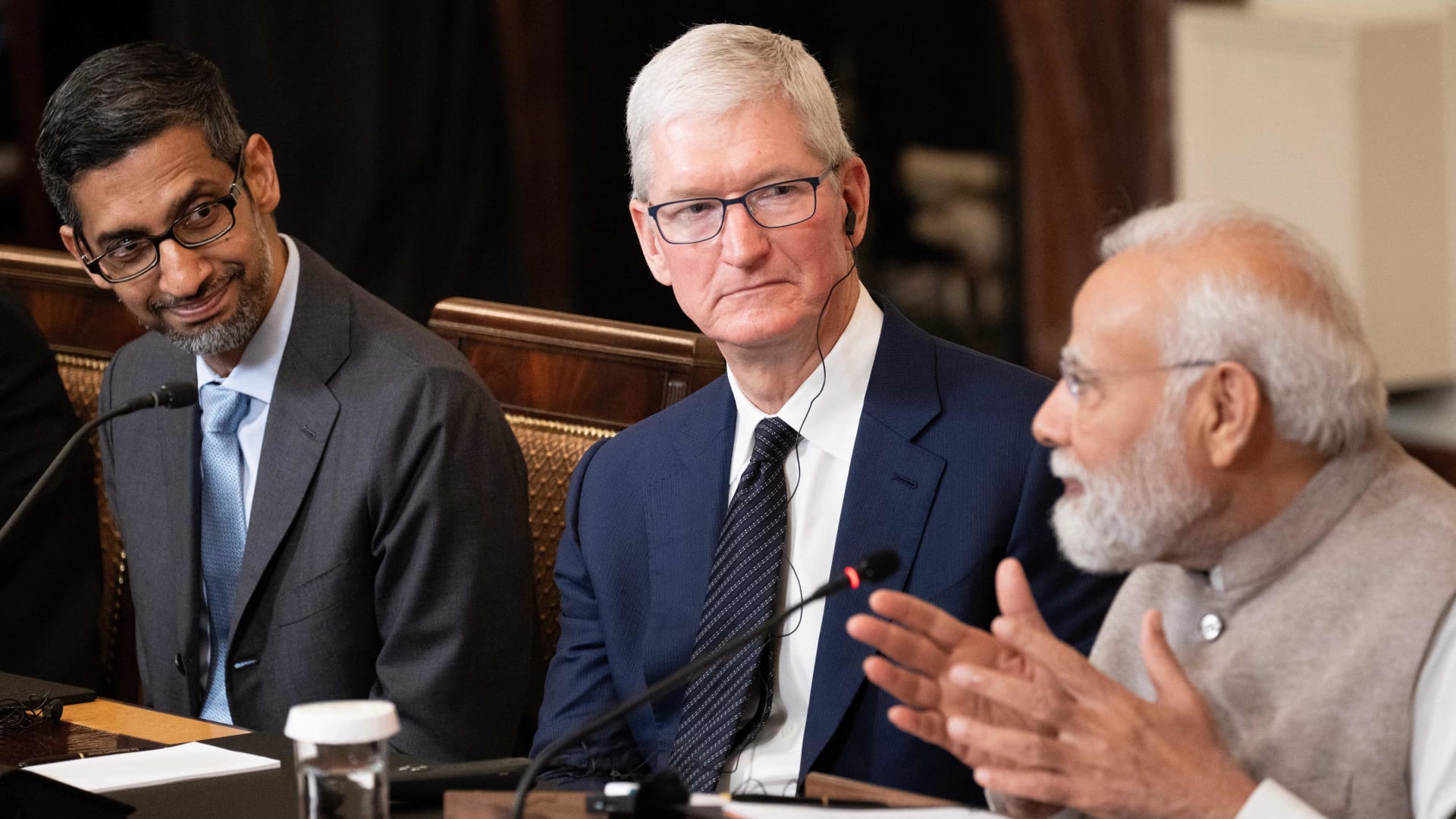
Google CEO Sundar Pichai and Apple CEO Tim Cook listen as India’s prime minister, Narendra Modi, speaks during a meeting with senior officials and CEOs of American and Indian companies, in the White House in Washington, D.C., on June 23, 2023.
Brendan Smialowski | AFP | Getty Images
The ironclad relationship that India Prime Minister Narendra Modi has developed with CEOs of the largest U.S. tech companies is giving his nation the foreign support that India has craved for more than a decade.
Those ties also have boosted Modi’s own profile ahead of key elections that start Friday, a former Indian government official told CNBC on the condition of anonymity.
The promise of further economic growth in India as China’s economy slows has led many American CEOs to support Modi’s policies.
Tensions between Washington and Beijing have also pushed U.S. conglomerates to diversify their manufacturing bases to countries including India to avoid disruptions from any potential conflict.
“Shifting supply chains away from rivals makes India a very important linchpin,” Manjari Chatterjee Miller, senior fellow for India, Pakistan, and South Asia at the Council on Foreign Relations, told CNBC.
The support from major U.S. companies also helps to shield Modi from criticism of India’s continued purchase of Russian and Iranian oil, as most major economies sanction the two nations.
Ahead of the election, Apple’s expansion into India in particular has given Modi political clout and created more investing interest among U.S. companies, experts told CNBC.
“The story of Apple, such a marquee name, has worked in Modi’s favor – not only has it helped the economy, but it has also given him political swagger,” said Pravin Krishna, Chung Ju Yung distinguished professor of international economics and business at Johns Hopkins University.
Modi has established an ongoing dialogue with a range of powerful Silicon Valley CEOs as India’s national election starts.
The election, which will end in early June, is expected to see more than 960 million citizens vote. Polls suggest Modi’s Bharatiya Janata Party is expected to win.
Indian Prime Minister Narendra Modi (R) meets with Elon Musk (L) in New York, United States on June 20, 2023. (Photo by Indian Press Information Bureau (PIB) / Handout/Anadolu Agency via Getty Images)
Indian Press Information Bureau | Anadolu Agency | Getty Images
Tesla CEO Elon Musk plans to head to New Delhi next week. Ahead of Musk’s visit, Modi’s government lowered import taxes on electric vehicles for manufacturers who invest $500 million in setting up production centers in India. The move has clearly drawn interest from Tesla.
The last meeting between the two leaders came in June in New York, where Musk brought up India’s high import tax, according to sources. Following Musk’s one-on-one meeting with Modi, he said Tesla was hoping to build a factory in India soon.
However, Tesla’s desire to expand in India goes beyond building and selling electric vehicles. Tesla is also interested in learning more about India’s lithium reserves, which were discovered in 2023, two sources told CNBC. A scarcity of lithium — a key EV component — as electric cars gain popularity has created an arms race among global manufacturers.
Modi’s rapport with corporate America has grown exponentially in the last 18 months as U.S. tensions with China push the West to look to India for opportunity.
Nvidia CEO Jensen Huang flew to India in September to meet the prime minister and discuss ways to work on artificial intelligence projects. During his trip, Huang revealed plans to partner with India’s Tata Partners and Reliance to build out the country’s AI infrastructure.
When Modi made a state visit to the White House in June, Alphabet CEO Sundar Pichai, Apple CEO Tim Cook, AMD CEO Lisa Su, among others, attended a roundtable to discuss opportunities to work with India on artificial intelligence.
Modi faces challenges to more investment
In order to ensure U.S. companies keep investing in India, Modi has some huge hurdles to overcome.
“Land and labor laws are at the top of the list,” Frank Wisner, former U.S. ambassador to India, told CNBC.
India’s current laws make it difficult to hire and fire workers, as well as buy land, which could pose problems for U.S. businesses trying to expand.
If Modi’s government is reelected, it will also be tasked with bringing down India’s high youth unemployment rate of 44% and implement training programs that would strengthen the country’s manufacturing base, adds Miller. If the underlying issues hindering India’s growth are not fixed, that could challenge U.S. companies from continuing to expand there, experts told CNBC.
“India’s reputation as a place to do business can accelerate even further if bureaucratic red tape, regulatory complexities, and mediocre corporate governance are gradually eradicated or minimized,” Dinyar Devitre, an advisory board member of General Atlantic who has served on multiple public boards including Altria, Kraft Foods, SAB Miller and IHS Markit, told CNBC.
For now, the money is pouring in. Foreign direct investment into India has steadily risen from $36 billion in 2014 to over $70 billion in 2023, according to Visual Capitalist. During the same period, investment in China has fallen.
ETF data shows investors continuing to allocate capital into India, according to Roundhill Investments’ Dave Mazza. So far this year, inflows to India sit at $2.5 billion, right behind Japan’s $3.5 billion. At the same time, China has seen outflows of nearly $1 billion.
“India remains one of the most attractive growth and investment stories for this decade,” says Jitania Kandhari, Managing Director at Morgan Stanley Investment Management to CNBC. Kandhari acknowledges that valuations are high but adds that “earnings have kept up.”







